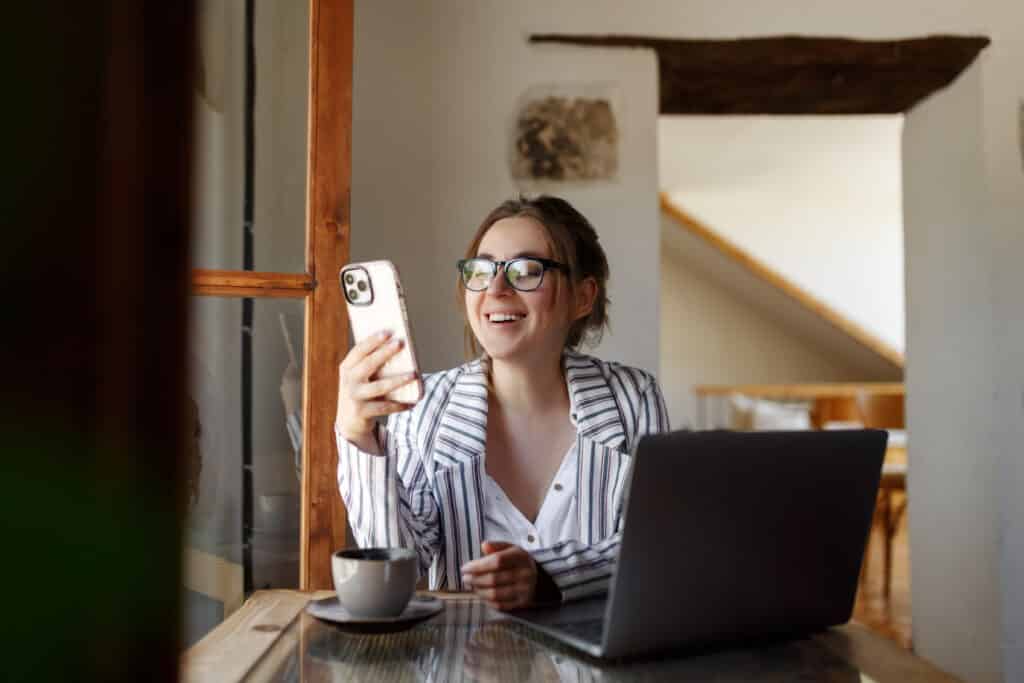Screens have become a normal part of our daily lives. Whether you’re someone who likes the internet and the digital world or you’re someone who only puts up with it when you have to, we’re all exposed to blue light from our screens on a regular basis. It’s known that sunlight can cause eye strain, especially when it’s especially bright outside. But what about blue light?
Here’s what you need to know about blue light, digital eye strain, and what you can do to protect your eyes.
What Is Blue Light?

Blue light doesn’t just come from our screens. It’s a type of electromagnetic wave, one with very short and high-energy wavelengths. When it comes from the sun, it helps to regulate your circadian rhythm and can boost your mood and your energy levels.
It can also come from screens, due to LED (light-emitting diode) technology. Your phone, laptop, TV, and more all emit high levels of this light, due to said LED technologies.
Is Blue Light Bad For You?
As previously mentioned, this type of light can actually be quite beneficial for your overall mood and energy levels, and ergo, your health. It helps to tell your body when it’s time to go to sleep and when it’s time to wake up.
However, with the advent of technology, people have been exposed to blue light from unnatural sources. This can lead to negative effects, such as an impacted sleep schedule, headaches, eye strain, fatigue, and more.
So, in short, no, during the day, it is not bad for you. However, too much of it, especially at night, can lead to adverse health effects.
About Digital Eye Strain
Whether you love technology or you hate it, using it has been a necessary part of the vast majority of people’s daily lives. Whether you need your phone in order to contact people or you work an office job that necessitates staring at a computer screen for 8 hours a day, even if you don’t use digital devices recreationally, for social media or watching videos or whatever else, we’re all using screens, and we’re all exposed to high levels of blue light.
In truth, the amount of light that is emitted from our devices is small, compared to how much the sun sends out. However, if you spend a lot of time on digital devices, your eyes get exposed to abnormal amounts of this type of light. This, combined with the amount of focus needed in order to focus on a screen, can lead to eye strain.
Eye strain can cause a variety of problems, from blurry vision to dry and itchy eyes to headaches and more. Some studies have shown an increased risk for macular degeneration with blue light.
If your eyes hurt after looking at a screen, it’s a good idea to adhere to the “20-20-20 rule”. This means that every 20 minutes, you look at something 20 feet away (that isn’t a screen) for 20 seconds. This can help to stave off the risk of eye strain.

Can Blue Light Blocking Glasses Help With Digital Eye Strain?
You would think so! However, there isn’t a clear consensus on how much these glasses can actually help with this type of eye strain. Some people claim that such glasses can do wonders for your eyes, while others claim that they don’t do much at all.
However, this type of glasses can help with your circadian rhythm. This is because through filtering out blue light, you can enjoy some protection from some of the adverse effects of overexposure to blue light, such as insomnia.
Some people do report that using blue light blocking glasses improve their eye comfort when using screens for extended periods of time. If you have any questions about eye strain from digital devices and what you can do to prevent it, you can talk to your eye doctor at your next eye exam about your specific circumstances.
Generally, combining the 20-20-20 rule with blue light blocking glasses and reduced use of digital devices at night time can reduce some of the negative effects of too much screen time.
Are You Considering Blue Light Blocking Glasses?
Wolcott Optical provides them in a wide variety of styles, so that you can select a pair that suits your specific style and personality. You don’t need a prescription for this type of glasses, so if you already have 20-20 vision, that doesn’t mean that these are not an option for you. To learn more about blue light blocking glasses, please do not hesitate to contact us today!
